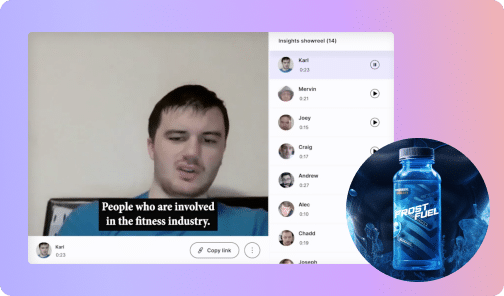Global circumstances have significantly changed how consumers search for and consume products in a bid to live a healthier and more conscious lifestyle. To keep up with these fast-paced consumer conversations, it’s crucial to gain insights quickly and adapt accordingly.
10 people
United States of America
18-35
Female, Male
The findings of the study showed a clear need for the introduction of a new sports drink containing all-natural ingredients.
The study entailed many insights, which can be viewed here. Some of the actionable insights can be found in the following.
Consumers are increasingly looking for sports drinks that offer more than just hydration. They are interested in drinks that not only contain higher levels of protein, vitamins, and minerals but also provide an energy boost without an excess of sugar or caffeine. Additionally, they are seeking products with probiotics and minerals that promote gut health and overall wellness.
Consumers are drawn to sports drinks made with all-natural ingredients, perceiving them to be healthier and cleaner, with less sugar and potentially more nutritional value. These attributes make them particularly appealing to those with health concerns or those striving to keep a balanced diet. However, there is some skepticism around the effectiveness and affordability of these products.
There are multiple takeaways from this test, but if we’d have to pick just one, it would be: be transparent in your communication of the science behind your claims and align with consumer expectations. While there were clear trends that emerged regarding consumers’ needs for nutritional benefits and low-sugar content, the study also highlighted a clear need for more healthy sports drink alternatives.
If this company had been real, the Sports Drink company would after this test be equipped to adapt its sports drink concepts across touchpoints and ensure a strong product-market fit.


Tailoring brand collateral and communication to meet female consumer preferences

Tailoring your product offering to meet consumer needs and preferences

Understanding your consumers’ preferences to maximize your product reach through celebrity collaborations
At GetWhy, we have spent the past five years building a proprietary generative AI. The key to its success is a digitalized dataset of 250,000 qualitative sessions that we have conducted in the past 10 years.
Want to learn more?